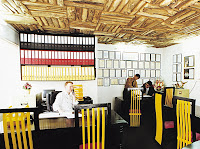A colleague of mine recently had to give a short presentation which involved describing a leader that inspired her, but using food as the analogy to describe that leadership inspiration. Her challenge caught my imagination and we had an interesting discussion about it. As we are in the catering sector, the humble onion is one ingredient that gets overlooked in our business and yet underpins so much of what we produce from our kitchen. With that in mind, here is a leadership analogy that might just work for you.
An onion packs lots of character despite its size.
 And like a true leader, this appearance belies an unflinching willpower that’s fueled by passion. (Be careful of the smaller ones, they tend to have more bite!)
And like a true leader, this appearance belies an unflinching willpower that’s fueled by passion. (Be careful of the smaller ones, they tend to have more bite!)
If you cut an onion open during a meeting, it’s aroma will definitely stand out.
… and this ability to ‘stand out from the crowd’ and leaving that memorable impression is what turns a good leader into a great one.
However, the same onion has a harmonizing effect when cut within a kitchen.
Skilled leaders create harmony and team spirit by motivating the people around them.
Sometimes the humble onion leads from the front - just look at French Onion Soup.
- true leaders don’t shy away from situations that others might find very challenging.
And in other recipes the onion leads from behind by bringing out the best in other flavours.
Through empathy, influence and skillful maneuvering, a smart leader can energise the team to raise their game.
 Onions add bite & texture when thrown in a salad, but cooked down in a sauce they add sweetness.
Onions add bite & texture when thrown in a salad, but cooked down in a sauce they add sweetness.
Different challenges have diverse paths to a solution requiring the canny leader to think outside the box and encourage the team to explore those paths.
Cutting across an onion reveals a number of rings - symbols of both strength and continuity.
Like great leadership, these represent new experiences or challenges, with one bigger than the last.
 And as any search on leadership will tell you, an onion - just like our proverbial leader - is made up of many layers.
And as any search on leadership will tell you, an onion - just like our proverbial leader - is made up of many layers.
For me, each layer represents a chapter in our experience that moulds us into the type of leader we are today.
As for stripping them away, you might think there will be nothing left. But paradoxically, I believe we are left with ‘everything else’. Put simpIy, the leaders who shaped our early behaviours, continue to influence our decisions today. So it is vital to seek out - and offer - great leadership!
If nurtured under the right conditions, an onion can be cultivated to produce a future crop.
This can also be said of true leadership skill. Be that manager, mentor or coach.
One final point about the humble onion:
like any great leader, they also have the potential to move you to tears.












